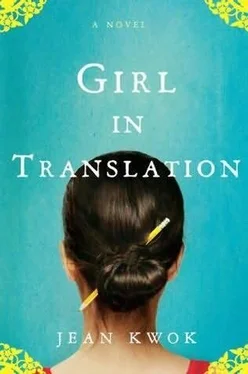“That,” I said, pointing to the strawberry cartons. “Two.”
“About time,” he said. When he rang up the price, it was three times more than it said on the carton. I saw Ma glance at the price tag, but she averted her gaze quickly. I didn’t know if I should speak up or how you complained about prices in English, so I kept silent as well. Ma paid without looking at the man or me, and we left. The ice cream tasted terrible: thin and sour, and it wasn’t until we got to the bottom that we found the fruit, jellified and in one lump.
On the way home from the store, I didn’t see any other Chinese people on the street, only blacks and a very few whites. It was quite busy, with some mothers and working people, but mostly groups of young men who swaggered as they walked. I overheard one of them calling a young woman on the street a “box.” The girl didn’t seem so boxlike to me. Ma kept her eyes averted and pulled me closer. Garbage was strewn everywhere: broken glass by doorways, old newspapers floating down the sidewalk, carried by the wind. The painted English writing was illegible and looked like swirls of pure anger and frenzy. It covered almost everything, even the cars parked on the street. There were a few large industrial buildings on the next block.
We saw an older black man sitting on a lawn chair in front of the used-furniture store beside our building. His face was turned up to the sun and his eyes were closed. His hair was a silver poof around his head. I gazed at him, thinking that no Chinese person I knew from home would deliberately try to make themselves tanner in the sun, especially if they were already as dark as this man was.
Suddenly, he leaped up in front of us and sprang into a one-legged martial arts pose with his arms outstretched. “Hi-yah!” he yelled.
Ma and I both screamed.
He burst into laughter, then started speaking English. “I got cha moves, don’t I? I’m sorry forscaring you ladies. I just love kung fu. My name is Al.”
Ma, who hadn’t understood a word he’d said, grabbed my jacket and said to me in Chinese, “This is a crazy person. Don’t speak to him, we’ll just tiptoe away.”
“Hey, that’s Chinese, right? You have anthn you can teach me?” he asked.
I had recovered enough to nod.
“So, there’s this very fat guy who comes into my store. What can I call him-he’s a real whale?”
“Whale,” I said in Cantonese. Now Ma looked at me like I had gone insane.
“Kung yu,” he repeated, with the tones all wrong.
“Whale,” I said again.
“King yu,” he said. He was really trying. Still gibberish but it was closer.
“That is better,” I said in English.
Ma actually giggled. I think she had never heard a non-Chinese person trying to speak our language before. “May your business be good,” she said in Chinese.
“Ho sang yee,” he repeated. “What does that mean?”
I told him in English, “It is to wish your store much money.”
His face broke out in the biggest, whitest smile I had ever seen. “Now I need that. Thank you.”
“You welcome,” Ma said in English.
Aside from Mr. Al’s store, many of the storefronts we could see were empty. We lived across the street from a huge lot filled with trash and rubble. There was a leaning apartment building sunken into the back of the lot, as if someone had forgotten to demolish it. I had seen black children clambering in the rubble, searching out bits and pieces of old toys and bottles to play with. I knew Ma would never let me join them.
On our side of the street, a few shops were open: a store with hair combs and incense in the window, a hardware store.

Even with the spray, the roaches were impossible to exterminate. We sprayed all the cracks and corners with roach spray, scattered mothballs through all our clothes and in a thick ring around our mattress. Still, the brown heads with wiggling antennae appeared out of every crack. As soon as we left an area or became too quiet, they approached. We were the only source of food in the entire building.
It was impossible to get used to them. I’d seen them in Hong Kong, of course, but not in our apartment. We’d had a nice simple place. Like most people in Hong Kong then, we didn’t have luxuries like a refrigerator, but Ma had kept our leftovers in a steel-mesh cage underneath the table and cooked every meal with fresh meat and vegetables just bought at the street market. I missed our neat little living room with its red couch and piano, on which Ma used to give lessons to kids after school. The piano had been a gift from Pa when they got married. We’d had to sell it when we came here.
Now I was learning to do everything noisily, thumping around in hopes of keeping them away. Ma often hurried to the rescue, clutching a bit of toilet paper to kill the roaches near me, but I screamed when I looked down at the sweater I was wearing and found a big one clinging to my chest. I don’t like to think about what happened when we slept.
I know that that was when the mice and rats came. Our first night I’d been aware of something running over me in my sleep and quickly developed the habit of sleeping burrowed deep in the covers. I wasn’t as afraid of rodents as I was of roaches, because mice are at least warm-blooded. I understood they were small living things. Ma was terrified of them. In Hong Kong, she’d refused to have a cat because she was afraid that they would bring her offerings of their prey. It didn’t matter that a cat actually reduced the number of live rodents. None was allowed in our house. After that night I told Ma I should sleep on the side of the mattress away from the wall because I needed to pee sometimes. I wanted to protect her from having to sleep closer to where the mice and rats were likely to be active. These were the small graces we bestowed upon each other then. They were all we had to give.
We set out a handful of mousetraps and quickly caught a few. Ma shrank back when she saw the limp bodies, and I wished desperately that Pa were alive so I wouldn’t have to do this. I knew I should have removed the dead mice and reused the mousetraps, but I couldn’t handle touching the dull flesh, and Ma made no complaint when I used a pair of chopsticks to pick up the traps, an act I immediately recognized as extremely unhygienic. I threw the traps, mice and chopsticks away, and after that, we put out no more mousetraps. That was Ma and me: two squeamish Buddhists in the apartment from hell.
We put the Tong Sing, the Chinese Almanac, at the head of the mattress. There are many phu in these books, words of power written by ancient masters that can pin a white bone demon under a mountain or repel wild fox spirits. In Brooklyn, we hoped they would keep any thieves away. I slept badly in that apartment and was jolted out of sleep by cars rumbling over potholes in the street. Ma whispered, “It’s all right.” Then she tweaked my ears to bring my sleeping soul back to my body and brushed my forehead three times with her left hand to ward off evil spirits.
Finally, my hands no longer came away covered with dust when I touched the walls. When we knew the apartment was as clean as we could get it, we set up five altars in the kitchen: to the earth god, the ancestors, the heavens, the kitchen god and Kuan Yin. Kuan Yin is the goddess of compassion who cares for all of us. We lit incense and poured tea and rice wine before the altars. We prayed to the local earth god of the building and apartment to grant us permission to live there in peace, to the ancestors and heavens to keep away troubles and evil people, to the kitchen god to keep us from starving and to Kuan Yin to bring us our hearts’ desires.
Читать дальше













